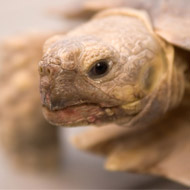Tortoise owners urged to delay hibernation

Owners should be advised to delay hibernation until November or December by keeping their pet warm using heat lamps.
British veterinary organisations have joined forces to ensure hibernating pets have a happy and healthy rest this winter.
The move follows BVA’s Voice of the Veterinary Profession Survey, which showed over 50 per cent of vets saw tortoises with weight loss or anorexia following their last hibernation.
The survey of more than 1600 BVA members revealed that many vets believe lack of understanding directly contributes to the animal developing such health problems.
“With modern advice having moved away from the traditional idea of placing your tortoise in a shoebox in the attic, many vets believed these health problems stemmed from the way the tortoise was hibernated,” said the BVA.
To ensure good hibernation husbandry, the BVA, BSAVA and BVZS have put together some tips for owners to make sure their pets stay healthy while having the best possible winter rest. The tips include:
• A pre-hibernation health check and weigh-in with a vet
• Weekly weight checks to ensure weight loss does not exceed five per cent of the starting body weight
• A temperature recommendation of between 5-8 degrees Celsius during hibernation to prevent problems like excessive weight loss or blindness
Although the weather is getting colder, the BVA said vets should advise owners to delay tortoise hibernation until November or December by keeping their pet warm using heat lamps. This will avoid an overlong hibernation that can result in depletion of energy stores, dehydration and accumulation of toxins.
BVZS president Mark Stidworthy also suggests tortoise owners use a fridge to hibernate their pet to avoid some of the hazards of traditional methods, like frostbit or rodent injury.
“We have a far greater knowledge now of a tortoise’s health and welfare needs; however, it’s possible those who have had tortoises for decades may not be aware of the new practices,” said Gudrun Ravetz, president of the BVA.
“We would always encourage tortoise owners make sure their pet has regular health checks with their vet to ensure good health and that they are equipped with the most up-to-date advice to prevent health problems.”



 The Animal and Plant Health Agency (APHA) has updated its online reporting service for dead wild birds.
The Animal and Plant Health Agency (APHA) has updated its online reporting service for dead wild birds.